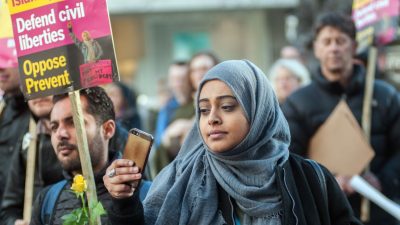Title: Tangled in Terror: Uprooting Islamophobia
Author: Suhaiymah Manzoor-Khan
Publisher: Pluto Press
Year: 2022
Tangled in Terror is an unapologetic intervention to the oversimplification of Islamophobia in popular culture, so crucial in a time of hot takes and soundbites that keep us from overturning oppression by meaningfully deepening solidarities and struggles as a collective pursuit of liberations.
This is ever more necessary since Islamophobia is a project that has been so successful in creating such a pungent distaste that it’s often discussed in censored, dignity-stripping and unnuanced ways. To be discursive about Islamophobia feels unsafe, criminalising (as it has been and is) and removed from its fatal realities and everyday traumatising impacts on Muslims.
In contrast, Suhaiymah Manzoor-Khan courageously bridges and holds together the many facets of terrorisation that Muslims face and endure – as well as the political and liberatory potential for anti-Islamophobia resistance in the work and direction of abolition.
From the outset, Manzoor-Khan is clear in her positionality. The book is not trying to convince us that Islamophobia exists – it irrefutably does – and refuses to engage in any proving of Muslims as ‘worthy’ of humanity, solidarity and dignity, if so and on what terms – the ‘good Muslim/bad Muslim’ trope. It is a deeply human and affirming contribution as well as a political and educative resource for Muslims and allies alike.
Manzoor-Khan carefully contextualises the anti-Muslim project within ‘white supremacy culture, racial hierarchy and global capitalism’ and its relationship to corresponding oppressions that are frequently presented as disparate. We see the usefulness and efficacy of terror-making in all aspects of life, ranging from economic systems, to militarisation, to public bodies, revealing the porous and insidious nature of Islamophobia and ‘counterterror’ apparatus on a local, national and global level. Through this approach, we can connect and identify the implications of these structures and the deepening entrenchment of all forms of structural and systemic violence, which continues to reproduce itself in ways that impoverish and deplete our dissent and political capacities.
If we don’t hold how Islamophobia emerges out of and reinforces other dimensions of oppression – such as securitisation, war-making, exploitative and extractive industries, border violence, gender justice and notions of nationhood (to name a few Manzoor-Khan illustrates) – we remain ill-equipped in our resistance efforts. In Tangled in Terror we find an accessible and multi-dimensional map of the facets of Islamophobia in which we are all tangled in some way or another, and therefore that we must all also grapple with. Yet we also see the inverse connective threads that can strengthen and unify us towards sharing visions of liberation and justice.
The notable effort to move away from discussing Islamophobia in the abstract means readers will experience the gravity, distress, heartbreak, anguish, grief and rage as they move through the history, legacies and ongoing violence Muslims experience. The painful personal testimonies woven throughout the book feel familiar and deeply intimate, especially to black and racialised working-class Muslims and those in the global majority/south. This is important to hold and feel, not turn away from. Perhaps here the unpalatability around us rings true: so much of the torture and violence Muslims face is undigestable, but swallowing untruths hurts us even more.
The book leaves us sitting in the practice of abolition work; to really begin to practice freedom beyond state structures and carceral logics and apparatus
It is in holding this context as part of her critical analysis that Manzoor- Khan allows us to aptly and discerningly locate how to do the work. The book leaves us sitting in the practice of abolition work; to really begin to practice freedom beyond state structures and carceral logics and apparatus and engage with some pertinent and urgent enquiry. What are the origins of terror-making? What is the source of fear? Who benefits and who loses from each? How are we all complicit in the tangles of ‘terror’? What are the collective consequences, local, national, global? How do we begin to unmake these cultures of securitisation, criminalisation, policing and surveillance that serve to abuse? What truly makes us safe and able to access care? What is the world that is possible for us, untangled from terror, in our bodies and beings?
Tangled in Terror is ready to put us to work, joined together in broader liberation and resistance.










